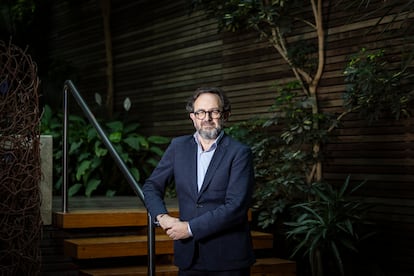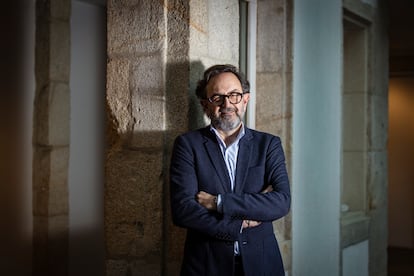Martín Lázaro, oncologist: ‘With immunotherapy, we are seeing long-term survivors from unthinkable tumors’
The doctor admits that some patients do not respond to these drugs and says there is still more to learn about immunity against cancer


A scientific revolution is underpinning the foundations of the fight against cancer: it is now known that no two tumors are the same, even if they are in the same organ, and oncological research, as it studies the fine print of tumors revealed by molecular biology, is moving towards increasingly more personalized drugs, which are even tailored to each patient. “Targeted drugs have been discovered that will allow us to select which treatments will be most effective and appropriate for patients based on their molecular alterations,” explains oncologist Martín Lázaro, 59, a doctor at the Vigo University Hospital Complex.
Lázaro, who is a specialist in lung and genitourinary tumors, explains the different areas of this new personalized precision medicine: it involves a therapeutic arsenal with increasingly targeted treatments, with patients given a greater role in the decision-making.
“Fortunately, we have passed the stage of paternalistic medicine, and now we take into account patients’ preferences, and they also decide what is best for them.” He gives an example: “If a patient has an advanced disease from a tumor with a poor prognosis, in which they are only expected to survive one year, and we offer them a treatment that can prolong their survival for an average two months, they may decide that, perhaps, it is not worth going back and forth to the hospital, having side effects that may limit them and prefer to invest that time in another way, because you have to take into account what we call time toxicity [the time spent receiving cancer-related medical care, including travel and waiting times],” explains the oncologist.
Question. What is the impact of time toxicity?
Answer. There are patients who spend a lot of time between tests, trips to the hospital, treatments... In pancreatic cancer, this can involve almost 20% of a patient's remaining survival time. And that is something that we have to take into account as well.
Q. Does this mean that not all the therapeutic arsenal is worth the effort?
A. I always tell patients that we have treatments that may be more or less effective. We know that a drug can prolong survival, that this prolongation in survival is statistically significant, but that perhaps it is more or less significant at a clinical level. In other words, I see the statistics and the influence of this treatment on survival is real, but perhaps the time in which we increase survival is more or less important and its real significance must be assessed in the consultation with each patient.
Q. A few days ago, the announcement of a saliva test for early cancer detection went viral and the Spanish Society of Medical Oncology had to warn that this experiment had no medical value. Were the findings magnified?
A. It is too soon to say that this saliva screening study can help us find patients early. It is true that sometimes we magnify what is published. We are so eager to see good news in that sense that we see the part that grabs our attention, but it is hard for us to see the connotations that it has afterward, and if it really implies something or not. We have to be very cautious because that sometimes leads to people getting false hopes.

Q. Has precision personalized oncology reached a stage of maturity?
A. We are in a stage of maturity in some areas: there is more and more knowledge of molecular biology and more drugs are being implemented in some tumors. I use lung cancer as an example: when I studied the specialty, we could expect a median survival time of 10 or 11 months. Fortunately, this cancer has been segmented into small parts, which are like slightly different tumors, and if a person comes to me with ALK-positive lung cancer [with an alteration in this gene, which accounts for 4% of lung tumors], I am going to start a therapy knowing that when the treatment stops working for that patient, new drugs will surely have come out that will allow me to select a better treatment for that person. The problem is that this is not true for all tumors; in some cancers we still have a long way to go: there is a significant percentage of patients for whom we cannot select the right treatment.
Q. You specialize in lung cancer, a type of tumor where immunotherapy has worked and changed the course of the disease in some cases. Yet, the overall prognosis remains unfavorable. How do you interpret that?
A. There are still many subgroups of people who do not respond well to treatment, but there are patients who do respond to immunotherapy and the response is of higher quality and, sometimes, very long-lasting. So much so that we are beginning to have patients who, after receiving two years of treatment then stopping it, have been living a normal life for two or three or even four years, without the disease progressing and without needing more treatments. There are tumors, however, that grow in a colder immunological environment, with less enhanced immunity, and there we have to explore strategies that allow us to convert that cold tumor into a hot tumor, which will respond better to immunotherapy. But there are many things we don’t know about immunity against cancer.
Q. In lung cancer, the profile of patients is changing: it is decreasing in men and increasing in women. Is the tumor changing?
A. It is beginning to be seen that women have a greater incidence [of lung cancer] because they adopted the smoking habit later. But it is true that in women it seems to be a slightly different tumor. In men, more than 90% of patients have a tobacco habit, and in women, it’s 50% or 80%. There are other factors that influence women: the hormonal environment has been discussed, which could be one of the favorable ones. It has also been seen that there are procarcinogens in tobacco that need to be activated so that they later become carcinogens, and that can be done through cytochromes [proteins] and some are more expressed in women. It is also true that it seems that women have a better prognosis compared to men.
Q. As they are different tumors, is the way of treating them also different?
A. We should take this very much into account because up until now, the way of treating tumors has been very similar. Women, in general, with chemotherapy and some drugs, experience more toxicity, and it is not well known why. We know that the disease looks a little different, and we should learn to stratify in studies based on gender as well.
Q. The survival rate for patients with some tumors has gone from being a number of months to a number of years, but oncologists always find it difficult to talk about curing cancer or making it chronic. Is the ultimate goal to save time?
A. There are situations in which we are helping to cure [cancer] and when the disease is advanced, what we do is try to prolong the disease for as long as possible. With immunotherapy, we are already achieving that. In some tumors, where it was unthinkable before, there are long-term survivors that we did not have before. And that is an irrefutable fact. But, to begin with, in advanced disease, the approach in most tumors will be to delay it progression.
Sign up for our weekly newsletter to get more English-language news coverage from EL PAÍS USA Edition
Tu suscripción se está usando en otro dispositivo
¿Quieres añadir otro usuario a tu suscripción?
Si continúas leyendo en este dispositivo, no se podrá leer en el otro.
FlechaTu suscripción se está usando en otro dispositivo y solo puedes acceder a EL PAÍS desde un dispositivo a la vez.
Si quieres compartir tu cuenta, cambia tu suscripción a la modalidad Premium, así podrás añadir otro usuario. Cada uno accederá con su propia cuenta de email, lo que os permitirá personalizar vuestra experiencia en EL PAÍS.
¿Tienes una suscripción de empresa? Accede aquí para contratar más cuentas.
En el caso de no saber quién está usando tu cuenta, te recomendamos cambiar tu contraseña aquí.
Si decides continuar compartiendo tu cuenta, este mensaje se mostrará en tu dispositivo y en el de la otra persona que está usando tu cuenta de forma indefinida, afectando a tu experiencia de lectura. Puedes consultar aquí los términos y condiciones de la suscripción digital.








































